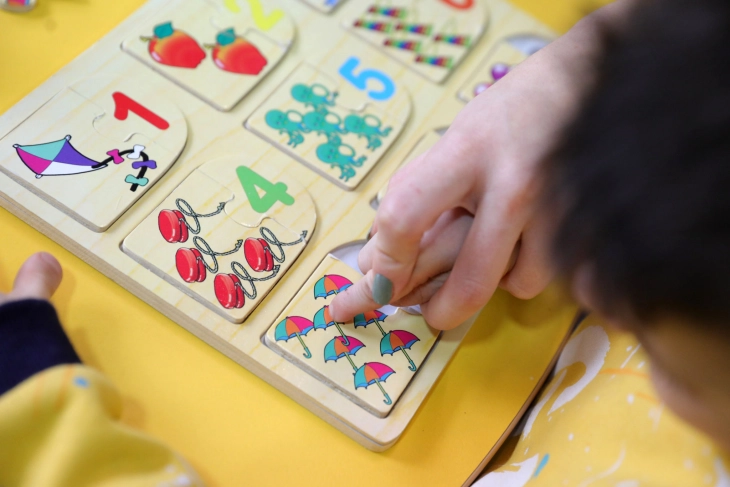Education Ministry to change concept of inclusive education through broader debate
- The Ministry of Education and Science will approach changes to the inclusive education of children with special educational needs, through a broader debate involving parents, teachers, practitioners and experts in the field. According to Education Minister Vesna Janevska, it is a complex and very delicate topic that will be in the focus of the Ministry.
- Post By Nevenka Nikolik
- 13:02, 3 July, 2024

Skopje, 3 July 2024 (MIA) – The Ministry of Education and Science will approach changes to the inclusive education of children with special educational needs, through a broader debate involving parents, teachers, practitioners and experts in the field. According to Education Minister Vesna Janevska, it is a complex and very delicate topic that will be in the focus of the Ministry.
She noted that according to indications of parents and teachers, the current concept of total inclusion of the children with special educational needs in regular education in the country is unsuccessful and there are complaints from parents who believe that in this way their children are further discriminated against.
Ahead of Wednesday's conference on inclusive education, organized by the Commission for Prevention and Protection against Discrimination, Janevska said the new approach will broadly involve parents because, she noted, "they don't want their children to be the object of pity, as has been the case in the past, but they seek support from the state for their children to become as much independent as possible."
"Children with special educational needs will not be recognized through their diagnosis, but through the potentials they acquire in the educational system. In the future, there will be changes in the way the inclusive education of children with special educational needs is implemented and, of course, greater support in the number of teacher assistants and education support personnel. There certainly are problems because the budget situation is not good, but we will do our best so that these children can normally be involved in the educational process with educational assistants. The intention of the Government is not to single out, separate and in some way discriminate against children who have special educational needs. All those children who can attend regular education will attend regular education. But there are parents who complain, whole associations who complain, that their children cannot follow the classes because neither the teachers nor the teacher assistants can cope with that problem," Janevska said.

She added that a solution will be sought in municipal schools involving a resource center, but only for those children who cannot attend regular classes. As Janevska said, there is a proposal that children with multiple disabilities and children with more severe forms of intellectual disabilities remain in the so-called special schools that have existed until four years ago.
"In doing so, we will give parents the opportunity, which they didn't have until now, to choose in accordance with the Commission for Functional Assessment and Evaluation, in which school or resource center they want their children to study. We will do this relatively quickly, we also need to pass a law, but in addition to talks with several associations, parents and teachers, we will also involve experts in the field, experts from universities who have been dealing with this problem for years," said the Minister.
She added that the problem with inclusion is not only in terms of children with special educational needs, but also Roma children who are relatively largely not included in the education system.
The conference on inclusive education was organized within the project "EU Support for Rule of Law" funded by the European Union.
The anti-discrimination commission expects to improve cooperation with the Ministry of Education and Science, which so far "is not at an enviable level", said the commission's president Igor Jadrovski stressing that education is one of their key strategic areas and only inclusive and quality education can prevent the creation of stereotypes and prejudice from an early age and enable work on building a more equal and fair society, free from discrimination.

"The anti-discrimination commission has so far detected more serious systemic problems and discriminatory practices in primary and secondary education, which points to the need for prevention of discrimination and sensibilisation of teaching and technical staff in schools," said Jadrovski.
He pointed out that the anti-discrimination commission is at the disposal of the Ministry of Education and Science in implementing systemic changes from the aspect of prevention and protection against discrimination and promotion of the principle of equality in education.
"We expect to be included in existing working groups on the most strategic laws in the field of education, such as the Law on Primary Education, the Law on Secondary Education and the Law on Textbooks for Primary and Secondary Education," he noted.
Photo: MIA / MIA archive







